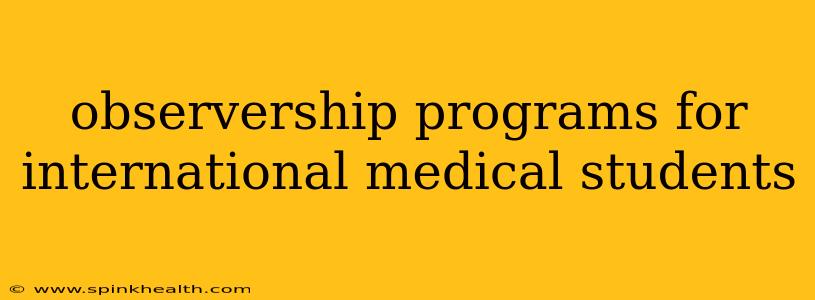Navigating the World of Observership Programs for International Medical Students: A Journey of Discovery
The dream of experiencing the vibrant pulse of medicine in a different country, learning from diverse healthcare systems, and expanding your medical horizons is a powerful one. For many international medical students, observership programs offer a unique pathway to achieving this dream. But the journey isn't always straightforward. It's a blend of meticulous planning, unwavering dedication, and a dash of serendipity. This guide will illuminate the path, addressing the common questions and concerns faced by aspiring international medical students seeking observership opportunities.
What are Observership Programs for International Medical Students?
Observership programs offer international medical students a chance to shadow physicians and healthcare professionals in a foreign country. Imagine yourself immersed in a bustling hospital in London, observing surgical procedures in a clinic in Sydney, or assisting in a community health initiative in rural India. These programs aren't just about passive observation; they're about active learning, cultural exchange, and professional development. You gain firsthand experience in different healthcare systems, witness diverse patient populations, and expand your understanding of global medicine.
How do I find Observership Programs?
Finding the right observership program is akin to finding the perfect puzzle piece. It takes research, patience, and a bit of creativity. Start by identifying your preferred location and medical specialty. Then, explore various avenues:
- Online Resources: Websites dedicated to international medical education often list observership programs. Professional organizations in your field might also offer leads.
- University Connections: Your medical school might have partnerships or recommendations for international observership opportunities. Faculty members can be invaluable sources of information.
- Networking: Attending medical conferences and connecting with physicians and professionals in your area of interest can uncover hidden gems. Don't underestimate the power of professional networking.
What are the requirements for Observership Programs?
The requirements can vary significantly depending on the program and the host country. Generally, you'll need:
- Medical School Enrollment: Proof of current enrollment in a recognized medical school is essential.
- Strong Academic Record: A high GPA demonstrates your commitment and capabilities.
- Letters of Recommendation: Strong recommendations from professors or physicians speak volumes about your character and potential.
- Visa and Travel Documents: Navigating visa requirements is crucial, often requiring significant paperwork and processing time.
- Health Insurance: Comprehensive health insurance is paramount, covering both medical emergencies and routine healthcare needs.
What is the cost of Observership Programs?
The cost varies widely. Some programs are free or offer minimal fees, while others involve substantial expenses related to travel, accommodation, visa fees, and health insurance. It's vital to budget meticulously and explore funding options, such as scholarships, grants, or personal savings.
What are the benefits of participating in an Observership Program?
The benefits are transformative:
- Exposure to Diverse Healthcare Systems: Gain insights into different healthcare models, diagnostic approaches, and treatment strategies.
- Enhanced Clinical Skills: Observe real-world medical practice, strengthening your clinical reasoning and decision-making skills.
- Global Networking: Build connections with physicians and healthcare professionals worldwide, broadening your professional network.
- Cultural Immersion: Gain a deeper understanding of different cultures and healthcare perspectives.
- Resume Enhancement: Participating in an observership program significantly strengthens your medical school application and future residency applications.
Are there any risks associated with Observership Programs?
While observership programs offer immense benefits, it's crucial to acknowledge potential risks:
- Financial Burden: The cost of programs can be significant for some students.
- Cultural Adjustment: Adapting to a new culture can be challenging, and homesickness can be a factor.
- Ethical Considerations: Understanding ethical guidelines and local regulations is crucial to avoid any potential conflicts.
- Medical Emergencies: While rare, unexpected medical issues can arise, highlighting the need for robust health insurance.
Embarking on an observership program is a journey of self-discovery, professional growth, and global engagement. It's an investment in your future and a testament to your dedication to medicine. By meticulously planning, thoroughly researching, and embracing the unknown, you can transform your dreams of international medical experience into a rewarding reality.

